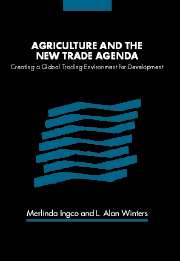Book contents
- Frontmatter
- Contents
- List of figures, tables, and boxes
- List of contributors
- Preface
- List of abbreviations
- 1 Introduction
- 2 Agriculture and the trade negotiations: a synopsis
- Part I Experience and lessons from the implementation of WTO agreements
- Part II Interests, options, and objectives in a new trade round
- Part III New trade rules and quantitative assessments of future liberalization options
- 8 Market access, export subsidies, and domestic support: developing new rules
- 9 Options for enhancing market access in a new round
- 10 Liberalizing tariff-rate quotas: quantifying the effects of enhancing market access
- 11 The global and regional effects of liberalizing agriculture and other trade in the new round
- 12 Modeling the effects on agriculture of protection in developing countries
- 13 Liberalizing sugar: the taste test of the WTO
- 14 Bananas: a policy overripe for change
- Part IV New trade issues and developing country agriculture
- Author index
- Subject index
- References
13 - Liberalizing sugar: the taste test of the WTO
Published online by Cambridge University Press: 27 February 2010
- Frontmatter
- Contents
- List of figures, tables, and boxes
- List of contributors
- Preface
- List of abbreviations
- 1 Introduction
- 2 Agriculture and the trade negotiations: a synopsis
- Part I Experience and lessons from the implementation of WTO agreements
- Part II Interests, options, and objectives in a new trade round
- Part III New trade rules and quantitative assessments of future liberalization options
- 8 Market access, export subsidies, and domestic support: developing new rules
- 9 Options for enhancing market access in a new round
- 10 Liberalizing tariff-rate quotas: quantifying the effects of enhancing market access
- 11 The global and regional effects of liberalizing agriculture and other trade in the new round
- 12 Modeling the effects on agriculture of protection in developing countries
- 13 Liberalizing sugar: the taste test of the WTO
- 14 Bananas: a policy overripe for change
- Part IV New trade issues and developing country agriculture
- Author index
- Subject index
- References
Summary
If ever there was a case for multilateral trade liberalization, and if ever there was a liberalization from which the global economy stood to gain, it is sugar. The world sugar market contains some of the largest and most blatant forms of trade protection. Many of these have a 300-year history. The worst are in developed countries, which greatly distort trade and prices in this commodity.
Although the world economy, consumers, and efficient sugar producers stand to gain substantially from liberalization, some producers, especially those in developed countries, stand to lose. And herein lies a political challenge: large vested interests are likely to oppose efforts to liberalize trade in sugar. In the Uruguay Round these vested interests won hands down. Should they win again during the new round, they are likely to further undermine the credibility of developed countries regarding the WTO, and of the WTO itself.
Countries ultimately liberalize trade unilaterally, but multilateral forums can assist that process. The greatest gains in trade liberalization come from reducing the biggest distortions first. Giving prominence to sugar and other highly protected products during the new WTO round makes economic sense. Such prominence will also help counter the vested interests opposed to reform. To aid in that process, this chapter analyzes the costs and benefits of distortions in the sugar market, and of options for reforming that sector.
A highly protected market
Over 80 percent of world sugar supplies sell at prices above the world price.
- Type
- Chapter
- Information
- Agriculture and the New Trade AgendaCreating a Global Trading Environment for Development, pp. 290 - 310Publisher: Cambridge University PressPrint publication year: 2004



